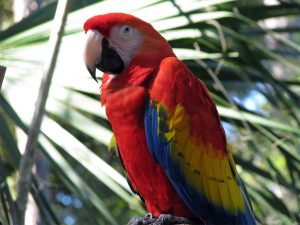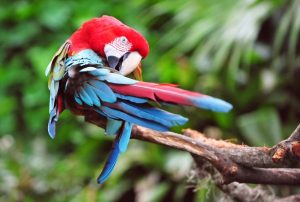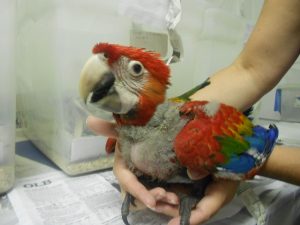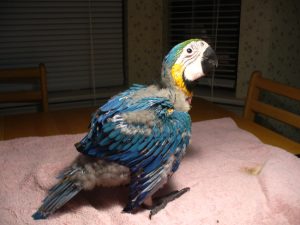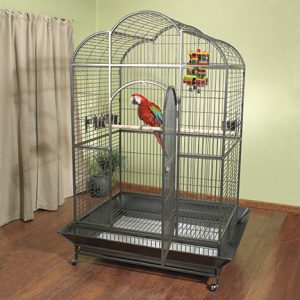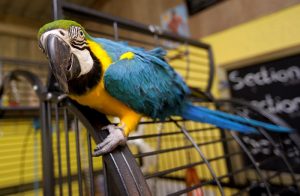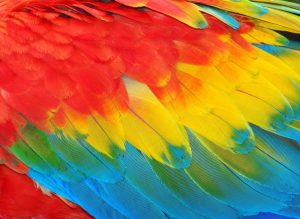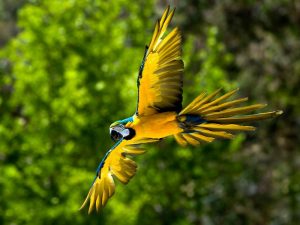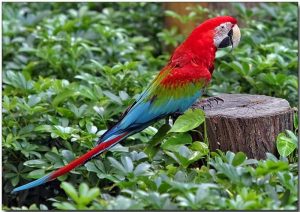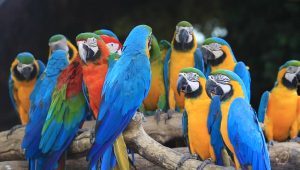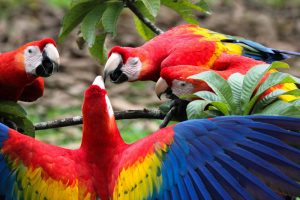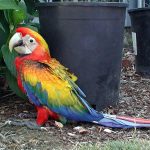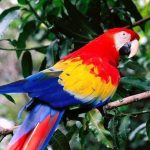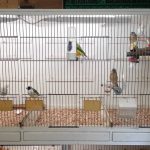Macaws
Macaws are actually giant parrots (Psittacidae) that come with attractive colors and mimicking abilities. The largest member of the macaw family is the 3-foot-long hyacinth macaw, while the smallest is the Hahn’s macaw, being similar in size to a standard parakeet.
These birds typically have a friendly disposition that makes them good pets or companion birds. However, many of these have become endangered due to this, with the Spix’s macaw possibly having become extinct in the wild. The glaucous macaw has also probably been driven to extinction, as there were only two confirmed sightings in the whole of the 20th century.
List of Macaw Species
- Severe Macaw (Chestnut-fronted macaw)
- Blue and Gold Macaw
- Blue-headed Macaw
- Great Green Macaw
- Hahn’s Macaw (Mini macaw)
- Scarlet Macaw
- Military Macaw
- Blue-winged Macaw
- Green-Wing Macaw (Red-and-Green Macaw)
- Hyacinth Macaw
- Golden-collared Macaw
- Red-bellied Macaw
- Lear’s Macaw (Endangered)
- Great Green Macaw (Endangered)
- Red-fronted Macaw (Endangered)
- Glaucous Macaw (Critically Endangered)
- Blue-Throated Macaw (Critically Endangered)
- Spix’s Macaw (Extinct in the Wild)
- Saint Croix Macaw (Extinct)
- Cuban Macaw (Extinct)
Hybrid Types of Macaw
- Catalina Macaw (Scarlet x Blue and Gold)
- Camelot Macaw (Catalina x Scarlet)
- Calico Macaw (Green-winged x Military)
- Harlequin Macaw (Green-winged x Blue and Gold)
- Caloshua Macaw (Blue and gold x Hyacinth)
- Shamrock Macaw (Military x Scarlet)
Video: Different Types of Macaw
Habitat in the Wild
Macaws are usually seen mostly in rainforests, with some preferring savannahs and woodlands. They are endemic to the Americas, residing in South America, Central America, and North America (only up to Mexico).
Mating and Breeding
Macaws in the wild are monogamous, meaning they keep the same partner for life, with their breeding season occurring between the seasons of spring to early summer. Most species lay 3-5 eggs which hatch after about 25-30 days.
Lifespan
Macaws are long-lived birds, with their lifespan ranging from 30 to 60 years or more. The smaller species have a shorter life than the larger ones, living for around 30 years, while the largest of the macaws can live to be 60 or upwards if given the right amount of care and enrichment.
Keeping Them as Pets
Housing
Most macaw species are large, requiring sufficiently roomy cages to live in. They tend to make a lot of noise, so it will be in your neighbors’ best interest to keep them in a soundproof room/cage to minimize their sound. Place perches within the cage, and provide enough toys, including foraging toys. Let them out of their cage for a few hours each day, as exercise is quite important for their well-being.
Video: Free-Flying Macaws
Temperament and personality
Macaws are generally friendly and affectionate birds as long as they get enough attention and company from their owner. It is important to build this bond between the bird and its owner as, with its strong beak, it is quite capable of inflicting a painful bite, even drawing blood on occasion. But a macaw only tends to attack when startled or feeling threatened, so make sure that your bird feels safe around you.
Their screeches reach a fever pitch during dawn and dusk, as in the wild, those are the times when they call to let their flock know it is time to disperse from/come back to the nesting sites. They are also rather intelligent and inquisitive.
Care
You need to replace the food and water dishes within the cage daily with fresh and clean ones. The enclosure must also be disinfected at least once every 6-12 months. Clip the nails and trim the feathers at regular intervals. Macaws like to bathe, so make sure to provide it with a large bowl with sufficient water in which it can bathe, or you can also use a mist spray.
Feeding: What do macaws eat
You can give your pet macaw a diet of pellets. Other fresh food options include fruits like apples, bananas, oranges, grapes, and melon and vegetables like carrots, kale, broccoli, Brussels sprouts, and celery. Never give it chocolates or avocados, as they are toxic for all members of the parrot family. In the wild, macaws eat nuts, seeds, fruits, leaves, stems, and flowers.
They are among the most omnivorous of parrots, and you may give your pet some meat from time to time for protein.
Training
- Never use negative reinforcement when training a macaw. If they are unable to learn what you are training them, it is probably going to take longer. You need to be patient and keep at it without yelling at them or beating them with sticks.
- Make yourself the best companion to your macaw. That will, in turn, endear you to your bird so much that you will be encouraged to pick up on what you’re teaching.
- Always back up a well-learned trick, be it being able to mimic a word or spreading the wings with a reward, with a bird treat. This will encourage them to learn faster.
Do Macaws Talk
The ability to mimic human speech varies between macaw species. The blue and gold and the scarlet macaws tend to pick up on words quickly and can surprise you with a few now and then. But some have only a moderate ability to mimic human speech, though they might still be able to copy sounds of the environment though, like doorbells and phone rings.
Video: Macaw Talking
Cost
Prices of macaws can vary widely depending on the species and their availability. It can cost you as little as a few hundred bucks to as high as in the thousands.
Interesting Facts
- Their strong beaks are one of their primary adaptations, helping them to crack seeds, nuts, and stems that they eat in the wild.
- The feather patterns on the face of all macaw species are unique to themselves, much like human fingerprints; no two are the same.



